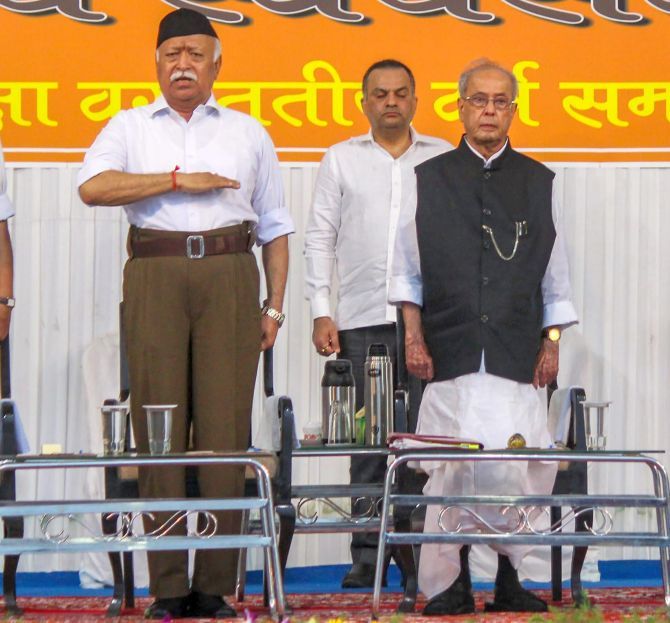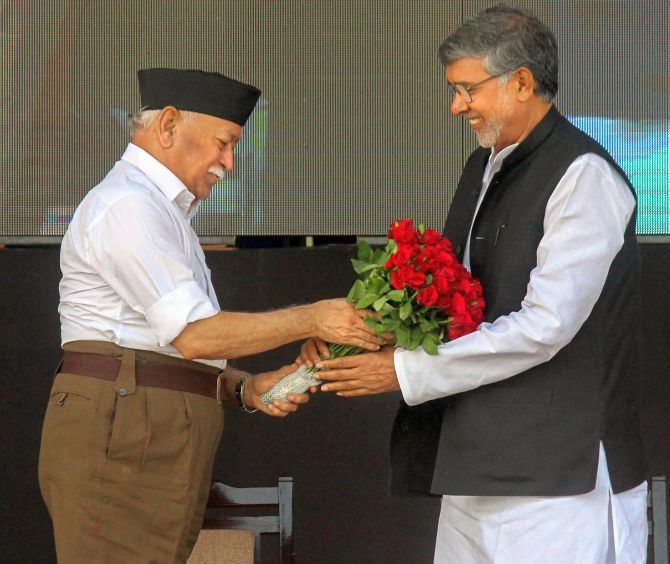'Mohan Bhagwat's reaffirmation of the RSS's Hindu rashtra ideal has shown that nothing has changed, that it remains firmly rooted in its fundamental beliefs, that the willingness to listen to voices from outside its fold was a pretence about being openminded,' argues Amulya Ganguli.

Pranab Mukherjee and Kailash Satyarthi must have realised by now their mistake of giving sage advice to the RSS at major functions at its Nagpur headquarters.
All that the former President, now a Bharat Ratna, and the Nobel Laureate told the RSS honchos and cadres about the virtues of pluralism and harmony made no impact as is evident from the RSS Sarsanghchalak Mohan Bhagwat's latest speech.
As the latter has confirmed, Hindu rashtra remains the organisation's 'non-negotiable goal'.
However, non-Hindus can stay in this rashtra if they consider themselves to be Indians.
Bhagwat did not clarify who will certify their Indianness.
Since Bhagwat's idea of India's nationhood goes against the grain of the Constitutional concept of a secular, multicultural country, the question can be asked as to what extent the notion of a quasi-religious State advocated by the BJP's ideological guru is acceptable to the ruling party which has sworn loyalty to the constitution as it stands today.
Are the two in sync or are they working towards a prescribed end which is a closely-guarded secret between them ?
The views of the RSS wouldn't have mattered in the absence of the BJP's political dominance.
During the decades when the Left-Liberals were in political control, the RSS's Hindu rashtra concept was as chimerical as the pro-Maoist agenda of the Left extremists.
But it's different now.

The BJP is currently in a position inside and outside parliament to push through measures which can overturn a Constitutional provision such as Article 370.
It is a big jump from deleting a legal specification to changing the country's pluralist ethos, but there are disquieting signs about the RSS/BJP's stance on Muslims.
One of them is the bill on citizenship which gives the status to all who seek it under duress except the Muslims.
The other is the national register of citizens which ostensibly targets illegal Muslim immigrants, but can unnerve other Muslims as well since they will have to prove their legal status to an overbearing and suspicious administration.
A third is the suggestion about Hindi's unifying potential which is in keeping with the longstanding 'Hindi, Hindu, Hindustan' slogan of the RSS.
A fourth is the charge made by the powers-that-be that a multi-party system has not been all that successful, which points to a gradual transition to a one-party arrangement.
To conspiracy theorists, all this might seem to be a preparation for introducing fundamental changes in the nation's functioning.
When the RSS invited Mukherjee and Satyarthi to lecture it about their alternative worldviews, the belief was that the closely-knit 94-year-old patriarchal organisation of upper caste Hindus was stepping out of its shell to enter the 21st century.
But Bhagwat's reaffirmation of the outfit's Hindu rashtra ideal has shown that nothing has changed, that it remains firmly rooted in its fundamental beliefs, that the willingness to listen to voices from outside its fold was a pretence about being openminded.
It should also warn others about responding positively to such invitations, for the RSS's apparent objective was not to participate in a free-wheeling intellectual exercise, but to gain a measure of respectability by pretending to emerge from its sepulchral environment of being the home of the Hindu Right.
Since the BJP's electoral successes have convinced the RSS that it no longer needs to reach out to the other side, Bhagwat has underlined the organisation's basic goal of ushering in a land of, by and for Hindus.
Amulya Ganguli is a writer on current affairs.










